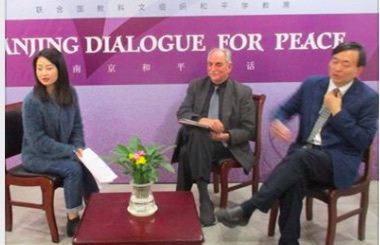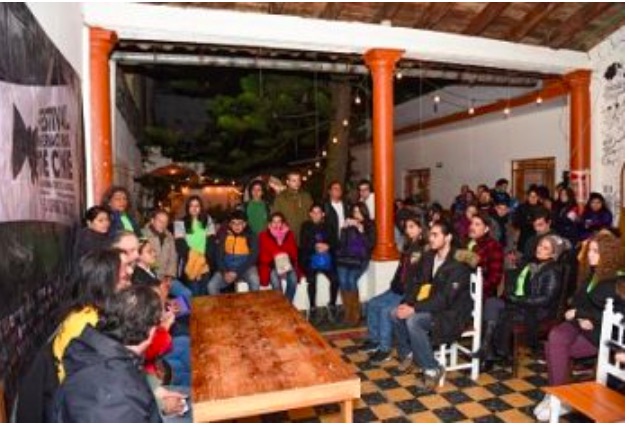The world went to Madrid last month in the hope that the countries of the world would finally take serious action to stop global warming.
An example came to us from Lok Raj Joshi in Nepal.
He writes that “a government team from Nepal led by the Minister for Forests and Environment, Shakti Bahadur Basnet, is taking part in COP-25. . . . Nepal is going to propose formulating a plan for coping with the adverse conditions resulting from global warming. Nepal is also lobbying for the Green Climate Fund. Highly affected countries like Nepal are entitled to receive it as compensation from the responsible countries that are releasing large quantity of carbon into the atmosphere.”
Lok explains that “climate change is an urgent matter for Nepalese people. First, its northern region is comprised of the snow-covered Himalaya mountains . . . The region of the Terai which supplies food to the rest of the country depends on water from the north. This relationship makes the adverse effects of global warming even more complex, more intense and more widespread creating a vicious cycle of disasters in Nepal. Second, agriculture and tourism based on natural beauties including the Himalayas, rivers, glaciers, lakes, jungles and wild animals are the major sources of income for Nepal. Hydroelectricity is the most potential area that is expected to contribute to realization of the Nepalese dream of prosperity. Unfortunately, these all have been the first targets of global warming.”
Environmental activists came to Madrid from around the world to urge action, especially young people (See CPNN, A Global Youth Movement ? ) The 500,000 people who marched in Madrid were addressed by Greta Thunberg who told them “We have been striking for over a year, and basically nothing has happened . . . The climate crisis is still being ignored by those in power, and we cannot go on like this.”
Many of those coming to Madrid were representatives of indigenous peoples who are especially threatened by climate change. Tom Goldtooth, executive director of the Indigenous Environmental Network, put it this way: “We’re here to stand in support of the people of Chile. We’re here to support the people of Colombia and Ecuador and Brazil who are fighting climate capitalism. We have to stand together with the people of the streets and of the forests and the land and the oceans, fighting neoliberalism, fighting imperialism. We’re fighting against the United States and its white supremacy, militarization. We have to look at these things and stand together in solidarity with the people.” CPNN readers might recall Tom Goldtooth from the Peru Climate Summit of 2014.
But those who came to Madrid, and the rest of the world, were to be disappointed by the results of the COP25 conference, as they were after previous COP conferences. In 2009, the rich countries pledged to mobilize $100 billion a year by 2020 for the United Nations Green Climate Fund. But only $3.5 billion has been committed out of $10.3 billion pledged. Now not only is Trump attempting to withdraw the United States from the Paris agreement, but last year, he straight-up canceled $2 billion in promised climate aid to poor countries.
At the end of this year’s conference, civil society groups including the Center for Biological Diversity, Oil Change International, and Friends of the Earth said, the deal that had been hammered out by the parties included an agenda brought by big polluters “straight to the halls of the U.N.” with the help of countries “historically most responsible for the climate crisis.” The deal as it stands would “condemn those on the frontlines of the climate crisis, while hiding the crimes of polluters . . . And it would lead to increased inequality with no increase in ambition, no real emissions reductions, and no pathway to 1.5 [degrees Celsius above pre-industrial levels.]”
“I’ve been attending these climate negotiations since they first started in 1991,” said Alden Meyer, director of strategy for the Union of Concerned Scientists, told the BBC. “But never have I seen the almost total disconnect we’ve seen here at COP25 in Madrid between what the science requires and the people of the world demand, and what the climate negotiations are delivering in terms of meaningful action.”
The issue of military pollution does not even make it onto the agenda of the COP. According to the study cited by the International Peace Bureau, “The US military is not only the most funded army in the world, it is also “one of the largest polluters in history, consuming more liquid fuels and emitting more climate-changing gases than most medium-sized countries”. The Department of Defence’s daily consumption alone is greater than the total national consumption of countries like Sweden, Switzerland or Chile.”
However, the relation of militarism and pollution is increasingly on the agenda of the global movements for peace and the environment. As we wrote in the November bulletin: The Pope’s propsal “that the money spent for these works of death should be devoted to human development and the struggle for the climate corresponds to the slogan adopted by the 160 or so organizations of the Collective “En marche pour la paix” which called for September 21 (International Day of Peace) to march for peace, climate, social justice and nuclear disarmament.”
|
SUSTAINABLE DEVELOPMENT |
FREE FLOW OF INFORMATION |
HUMAN RIGHTS |
DEMOCRATIC PARTICIPATION |
|
EDUCATION FOR PEACE |
DISARMAMENT & SECURITY |
TOLERANCE & SOLIDAIRTY |
WOMEN’S EQUALITY |







